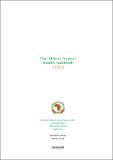Pan African Animal Resources Yearbook 2003

(en=English; ar=Arabic; fr=French; pt=Portuguese)
Language
enDate
2003Author
African Union Inter-African Bureau for Animal Resources
Type
YearbookItem Usage Stats
155
views
views
59
downloads
downloads
Abstract
The Pan-African Animal Resources Yearbook (PARYB) will continue to evolve with its resignation as to cover all areas of Animal Resources in Africa instead of only Animal Health related issues. Thus more data and information on Animal production, trade and Marketing, Fisheries and Aquaculture etc will continue to be added to the contents of the book. This transformation started since the last the last three previous editions of the book. Furthermore, with the gradual expansion in the scope and coverage of the Animal Resources Information System (ARIS) and the addition of more operational modules to the system as well as its acceptance as a continental reporting and database by MSs and RECs, more authentic data is being generated directly from Member States of the African Union (AU-MSs) at both national and sub-national levels and shared to AU-IBAR and the Regional Economic Communities. The current edition of the PARYB, in addition to previous areas of coverage, includes information on Fish health, broader information on animal breed and genetics instead of the traditional animal population figures, trade and marketing information as well as information on policy analysis that affects the animal resources sector on the African continent.
Description
The Inter-African Bureau for Animal Resources (IBAR), the scientific and technical organ of the African Union (AU) in matters related to livestock has been
in existence for over 50 years. The Bureau was established initially to control major animal diseases, an activity which it still pursues; animal production
was later added to its portfolio. The eradication of rinderpest from almost all parts of Africa, except for suspicion of mild forms of the disease in the Somali
eco-system, is one of the major achievements of IBAR. With time, the tasks of IBAR evolved to incorporate more broadly the demands of livestock
development in Africa. The scope of IBAR’s activities have been widened from traditional animal health and production to encompass facilitation of
livestock marketing, improvement of pastoral livelihood by better service delivery and conflict resolution; and better management of resources and the
environment, particularly so far as the wildlife/livestock interface is concerned. Most of these activities are implemented by IBAR through projects and
programmes in close collaboration with a variety of development partners and livestock ministries/departments in AU-member countries.
One of the major Programmes currently implemented by IBAR is the Pan- African Programme for the Control of Epizootics (PACE), which focuses mainly on
the eradication of rinderpest and strengthening of surveillance activities in 30 AU-member states. Capacity created or enhanced in these countries as well
as within IBAR has enabled the collection and collation of a large amount of data resulting from disease surveillance and related activities. The present
issue of the Pan-African Animal Health Yearbook is a result of information generated from data collected from AU-member countries over the last year. This
is in line with one of IBAR’s major objectives, viz. collection, collation and dissemination of information on important animal issues across Africa. With
continued and expanded assistance from AU-member countries, IBAR will continue providing up-to-date information and services for the benefit of all.